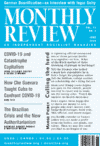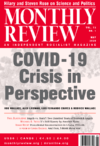
I wake every day to this
A new poem by Marge Piercy. | more…

A new poem by Marge Piercy. | more…

In recent years, “racial capitalism” has ascended across the humanities and social sciences. It has arisen as a conceptual framework to understand the mutually constitutive nature of racialization and capitalist exploitation, inter alia, on a global scale, in specific localities, in discrete historical moments, in the entrenchment of the carceral state, and in the era of neoliberalization and permanent war. | more…

Organized labor—based on white-exclusive and later white-dominated, though not necessarily exclusive, trade unions—formed itself as part of the settler state, not in the sense of being an apparatus of the state, but in the sense of accepting certain important precepts. The unions took for granted the nature of the settler state and, as such, conceived that the unions were to exist to serve the “legitimate” population, or at least the working class of the legitimate population. | more…

Capitalism is a global racialized structure. Although many of the exploited working class are white peoples, people of color, especially women of color, have generally borne the brunt of the human suffering inflicted by capitalism. There is no doubt that colonialism and U.S. slavery were economic systems, but they were also brutal attacks on non-Western peoples. | more…

Oliver Cromwell Cox insisted on dealing with the crucial issues of his time and on telling the truth as he saw it, regardless of whose toes may have been stepped on or whose sensibilities may have been injured. He has aided in preventing the complete stultification of academic social science and in the long run exercised an immense influence on American life. | more…

August 2019 saw numerous commemorations of the year 1619, when what was said to be the first arrival of enslaved Africans occurred in North America. Yet in the 1520s, the Spanish, from their imperial perch in Santo Domingo, had already brought enslaved Africans to what was to become South Carolina. The enslaved people here quickly defected to local Indigenous populations, and compelled their captors to flee. Deploying illuminating research, The Dawning of the Apocalypse is a riveting revision of the “creation myth” of settler colonialism and how the United States was formed. Here, Gerald Horne argues forcefully that, in order to understand the arrival of colonists from the British Isles in the early seventeenth century, one must first understand the “long sixteenth century”—from 1492 until the arrival of settlers in Virginia in 1607. | more…

The current massive oil glut is the product of the effects of the tight oil or shale oil revolution, which for a time turned the United States into the biggest oil and gas producer in the world. Now, suddenly as a result of an overproduction of world oil, made far worse by the sudden falloff in demand due to the COVID-19 pandemic, we are witnessing the possible euthanasia of the U.S. tight oil industry, bleeding cash even before the oil price collapse and encumbered with mountains of debt. | more…

Since the late twentieth century, capitalist globalization has increasingly adopted the form of interlinked commodity chains controlled by multinational corporations, connecting various production zones, primarily in the Global South, with the apex of world consumption, finance, and accumulation primarily in the Global North. COVID-19 has accentuated as never before the interlinked ecological, epidemiological, and economic vulnerabilities imposed by capitalism. | more…

In 2021, Angela Merkel’s fourth and last term as the chancellor of Germany will end. To understand Merkel’s domestic and foreign policy, one must understand the country she inherited. She came to power in 2005 following the first center-left government since 1982, the government of Gerhard Schröder, and was in the fortunate position of becoming chancellor after a coalition government of social democrats and Greens had done the devil’s bidding of implementing very unpopular neoliberal policies to the sole benefit of German capital and the rich. | more…

A new poem by Marge Piercy. | more…

A new poem from Marge Piercy. | more…

In its wider economic, ecological, epidemiological, and public health context, the current COVID-19 pandemic demonstrates the enormous dangers of the metabolic rift in human ecology and epidemiology brought on by capitalist social relations in the age of monopoly-finance capital, global agribusiness, and intricate, globe-spanning supply chains associated with the extreme exploitation and expropriation of both human beings and nature. Neoliberalism, representing the inner logic of capitalism, has left the world vulnerable to catastrophe wherever it has come into play. | more…
Notifications